Organizers

Bio
Isabelle Guyon recently joined Google Brain as a research scientist. She is also professor of artificial intelligence at Université Paris-Saclay (Orsay). Her areas of expertise include computer vision, bioinformatics, and power systems. She is best known for being a co-inventor of Support Vector Machines. Her recent interests are in automated machine learning, meta-learning, and data-centric AI. She has been a strong promoter of challenges and benchmarks, and is president of ChaLearn, a non-profit dedicated to organizing machine learning challenges. She is community lead of Codalab competitions, a challenge platform used both in academia and industry. She co-organized the “Challenges in Machine Learning Workshop” @ NeurIPS between 2014 and 2019, launched the "NeurIPS challenge track" in 2017 while she was general chair, and pushed the creation of the "NeurIPS datasets and benchmark track" in 2021, as a NeurIPS board member.

Bio
Rob Fergus is an Associate Professor of Computer Science at the Courant Institute of Mathematical Sciences, New York University. He received a Masters in Electrical Engineering with Prof. Pietro Perona at Caltech, before completing a PhD with Prof. Andrew Zisserman at the University of Oxford in 2005. Before coming to NYU, he spent two years as a post-doc in the Computer Science and Artificial Intelligence Lab (CSAIL) at MIT, working with Prof. William Freeman. He has received several awards including a CVPR best paper prize, a Sloan Fellowship & NSF Career award and the IEEE Longuet-Higgins prize.
Bio
Suchi Saria is an assistant professor of computer science, health policy and statistics at Johns Hopkins University. Her research interests are in statistical machine learning and computational healthcare. Specifically, her focus is in designing novel data-driven computing tools for optimizing decision-making. Her work is being used to drive electronic surveillance for reducing adverse events in the inpatient setting and individualize disease management in chronic diseases. She received her PhD from Stanford University with Prof. Daphne Koller.
Her work has received recognition in the form of two cover articles in Science Translational Medicine (2010, 2015), paper awards by the the Association for Uncertainty in Artificial Intelligence (2007) and the American Medical Informatics Association (2011), an Annual Scientific Award by the Society of Critical Care Medicine (2014), a Rambus Fellowship (2004-2010), an NSF Computing Innovation fellowship (2011), and competitive awards from the Gordon and Betty Moore Foundation (2013), and Google Research (2014). In 2015, she was selected by the IEEE Intelligent Systems to the AI's 10 to Watch'' list. In 2016, she was selected as a DARPA Young Faculty awardee and to Popular Science'sBrilliant 10’’.
Bio
Sergio Escalera obtained the P.h.D. degree on Multi-class visual categorization systems at Computer Vision Center, UAB. He obtained the 2008 best Thesis award on Computer Science at Universitat Autònoma de Barcelona. He leads the Human Pose Recovery and Behavior Analysis Group at UB, CVC, and the Barcelona Graduate School of Mathematics. He is an associate professor at the Department of Mathematics and Informatics, Universitat de Barcelona. He is an adjunct professor at Universitat Oberta de Catalunya, Aalborg University, and Dalhousie University. He has been visiting professor at TU Delft and Aalborg Universities. He is a member of the Visual and Computational Learning consolidated research group of Catalonia. He is also a member of the Computer Vision Center at Campus UAB. He is Editor-in-Chief of American Journal of Intelligent Systems and editorial board member of more than 5 international journals. He is advisor, director, and vice-president of ChaLearn Challenges in Machine Learning, leading ChaLearn Looking at People events. He is co-founder of PhysicalTech and Care Respite companies. He is also member of the AERFAI Spanish Association on Pattern Recognition, ACIA Catalan Association of Artificial Intelligence, and he is vice-chair of IAPR TC-12: Multimedia and visual information systems. He has different patents …

Bio
Isabelle Guyon recently joined Google Brain as a research scientist. She is also professor of artificial intelligence at Université Paris-Saclay (Orsay). Her areas of expertise include computer vision, bioinformatics, and power systems. She is best known for being a co-inventor of Support Vector Machines. Her recent interests are in automated machine learning, meta-learning, and data-centric AI. She has been a strong promoter of challenges and benchmarks, and is president of ChaLearn, a non-profit dedicated to organizing machine learning challenges. She is community lead of Codalab competitions, a challenge platform used both in academia and industry. She co-organized the “Challenges in Machine Learning Workshop” @ NeurIPS between 2014 and 2019, launched the "NeurIPS challenge track" in 2017 while she was general chair, and pushed the creation of the "NeurIPS datasets and benchmark track" in 2021, as a NeurIPS board member.

Bio
Research Interests: Design of information appliances Connections between complexity and statistical physics Distributed computing on networks How will "born digital" material be accessed and managed in the libraries of the future?
Bio
Bernhard Scholkopf received degrees in mathematics (London) and physics (Tubingen), and a doctorate in computer science from the Technical University Berlin. He has researched at AT&T Bell Labs, at GMD FIRST, Berlin, at the Australian National University, Canberra, and at Microsoft Research Cambridge (UK). In 2001, he was appointed scientific member of the Max Planck Society and director at the MPI for Biological Cybernetics; in 2010 he founded the Max Planck Institute for Intelligent Systems. For further information, see www.kyb.tuebingen.mpg.de/~bs.
Bio
Tom Dietterich (AB Oberlin College 1977; MS University of Illinois 1979; PhD Stanford University 1984) is Professor and Director of Intelligent Systems Research at Oregon State University. Among his contributions to machine learning research are (a) the formalization of the multiple-instance problem, (b) the development of the error-correcting output coding method for multi-class prediction, (c) methods for ensemble learning, (d) the development of the MAXQ framework for hierarchical reinforcement learning, and (e) the application of gradient tree boosting to problems of structured prediction and latent variable models. Dietterich has pursued application-driven fundamental research in many areas including drug discovery, computer vision, computational sustainability, and intelligent user interfaces.
Dietterich has served the machine learning community in a variety of roles including Executive Editor of the Machine Learning journal, co-founder of the Journal of Machine Learning Research, editor of the MIT Press Book Series on Adaptive Computation and Machine Learning, and editor of the Morgan-Claypool Synthesis series on Artificial Intelligence and Machine Learning. He was Program Co-Chair of AAAI-1990, Program Chair of NIPS-2000, and General Chair of NIPS-2001. He was first President of the International Machine Learning Society (the parent organization of ICML) and served a term on the NIPS Board of …

Bio
Isabelle Guyon recently joined Google Brain as a research scientist. She is also professor of artificial intelligence at Université Paris-Saclay (Orsay). Her areas of expertise include computer vision, bioinformatics, and power systems. She is best known for being a co-inventor of Support Vector Machines. Her recent interests are in automated machine learning, meta-learning, and data-centric AI. She has been a strong promoter of challenges and benchmarks, and is president of ChaLearn, a non-profit dedicated to organizing machine learning challenges. She is community lead of Codalab competitions, a challenge platform used both in academia and industry. She co-organized the “Challenges in Machine Learning Workshop” @ NeurIPS between 2014 and 2019, launched the "NeurIPS challenge track" in 2017 while she was general chair, and pushed the creation of the "NeurIPS datasets and benchmark track" in 2021, as a NeurIPS board member.
Bio
Zoubin Ghahramani is Professor of Information Engineering at the University of Cambridge, where he leads the Machine Learning Group. He studied computer science and cognitive science at the University of Pennsylvania, obtained his PhD from MIT in 1995, and was a postdoctoral fellow at the University of Toronto. His academic career includes concurrent appointments as one of the founding members of the Gatsby Computational Neuroscience Unit in London, and as a faculty member of CMU's Machine Learning Department for over 10 years. His current research interests include statistical machine learning, Bayesian nonparametrics, scalable inference, probabilistic programming, and building an automatic statistician. He has held a number of leadership roles as programme and general chair of the leading international conferences in machine learning including: AISTATS (2005), ICML (2007, 2011), and NIPS (2013, 2014). In 2015 he was elected a Fellow of the Royal Society.
Bio
Yair Weiss is an Associate Professor at the Hebrew University School of Computer Science and Engineering. He received his Ph.D. from MIT working with Ted Adelson on motion analysis and did postdoctoral work at UC Berkeley. Since 2005 he has been a fellow of the Canadian Institute for Advanced Research. With his students and colleagues he has co-authored award winning papers in NIPS (2002),ECCV (2006), UAI (2008) and CVPR (2009).
Bio
Yoshua Bengio (PhD'1991 in Computer Science, McGill University). After two post-doctoral years, one at MIT with Michael Jordan and one at AT&T Bell Laboratories with Yann LeCun, he became professor at the department of computer science and operations research at Université de Montréal. Author of two books (a third is in preparation) and more than 200 publications, he is among the most cited Canadian computer scientists and is or has been associate editor of the top journals in machine learning and neural networks. Since '2000 he holds a Canada Research Chair in Statistical Learning Algorithms, since '2006 an NSERC Chair, since '2005 his is a Senior Fellow of the Canadian Institute for Advanced Research and since 2014 he co-directs its program focused on deep learning. He is on the board of the NIPS foundation and has been program chair and general chair for NIPS. He has co-organized the Learning Workshop for 14 years and co-created the International Conference on Learning Representations. His interests are centered around a quest for AI through machine learning, and include fundamental questions on deep learning, representation learning, the geometry of generalization in high-dimensional spaces, manifold learning and biologically inspired learning algorithms.
Bio
Léon Bottou received a Diplôme from l'Ecole Polytechnique, Paris in 1987, a Magistère en Mathématiques Fondamentales et Appliquées et Informatiques from Ecole Normale Supérieure, Paris in 1988, and a PhD in Computer Science from Université de Paris-Sud in 1991. He joined AT&T Bell Labs from 1991 to 1992 and AT&T Labs from 1995 to 2002. Between 1992 and 1995 he was chairman of Neuristique in Paris, a small company pioneering machine learning for data mining applications. He has been with NEC Labs America in Princeton since 2002. Léon's primary research interest is machine learning. His contributions to this field address theory, algorithms and large scale applications. Léon's secondary research interest is data compression and coding. His best known contribution in this field is the DjVu document compression technology (http://www.djvu.org.) Léon published over 70 papers and is serving on the boards of JMLR and IEEE TPAMI. He also serves on the scientific advisory board of Kxen Inc .
Bio
Sara A. Solla obtained a BSc in Mathematics and Physics and a MSc in Physics at the University of Buenos Aires in Argentina, and a PhD in Physics at the University of Washington in Seattle, where she trained in statistical physics, critical phenomena, and renormalization group. While a postdoc at Cornell University in Ithaca, she heard John Hopfield talk about memory storage and retrieval through attractor dynamics, and life was never the same. She spent fruitful and exciting years as member of the legendary Neural Networks group at Bell Laboratories. She then joined the faculty at Northwestern University, where she is Professor of neuroscience and Professor of Physics and Astronomy. Her work in theoretical and computational neuroscience uses conceptual, mathematical, and computational frameworks from statistical physics, statistical inference, and nonlinear dynamics to investigate information processing in the brain at the systems level.
Bio
Michael Kearns is Professor and National Center Chair in the Computer and Information Science department at the University of Pennsylvania. His research interests include topics in machine learning, algorithmic game theory, social networks, and computational finance. Prior to joining the Penn faculty, he spent a decade at AT&T/Bell Labs, where he was head of AI Research. He is co-director of Penn’s Warren Center for Network and Data Sciences (warrencenter.upenn.edu), and founder of Penn’s Networked and Social Systems Engineering (NETS) undergraduate program (www.nets.upenn.edu). Kearns consults extensively in technology and finance, and is a Fellow of the Association for the Advancement of Artificial Intelligence and the American Academy of Arts and Sciences.

Bio
Daphne Koller is CEO and Founder of insitro, a machine learning-driven drug discovery company. She was the co-founder and co-CEO of Coursera, an online education platform for massive open online courses (MOOCs), which has reached over 100M learners worldwide. Daphne was the Rajeev Motwani Professor of Computer Science at Stanford University, where she served on the faculty for 18 years, and remains an Adjunct Faculty member. She is the author of over 300 refereed publications appearing in venues such as Science, Cell, Nature Genetics, NeurIPS, and ICML, with an h-index of 150. Daphne was recognized as one of TIME Magazine’s 100 most influential people in 2012 and Newsweek’s 10 most important people in 2010. She received the Sloan Foundation Faculty Fellowship in 1996, the ONR Young Investigator Award in 1998, the Presidential Early Career Award for Scientists and Engineers (PECASE) in 1999, the IJCAI Computers and Thought Award in 2001, the MacArthur Foundation Fellowship in 2004, the ACM Prize in Computing in 2008, the ACM AAAI Allen Newell Award in 2019, the IEEE CS Women of ENIAC Computer Pioneer award and the AnitaB.org Technical Leadership Abie Award Winner in 2022. Daphne was inducted into the National Academy of Sciences in …
Bio
John Shawe-Taylor has contributed to fields ranging from graph theory through cryptography to statistical learning theory and its applications. However, his main contributions have been in the development of the analysis and subsequent algorithmic definition of principled machine learning algorithms founded in statistical learning theory. This work has helped to drive a fundamental rebirth in the field of machine learning with the introduction of kernel methods and support vector machines, driving the mapping of these approaches onto novel domains including work in computer vision, document classification, and applications in biology and medicine focussed on brain scan, immunity and proteome analysis. He has published over 300 papers and two books that have together attracted over 60000 citations. He has also been instrumental in assembling a series of influential European Networks of Excellence. The scientific coordination of these projects has influenced a generation of researchers and promoted the widespread uptake of machine learning in both science and industry that we are currently witnessing.
Bio
Research Professor in the Computer Science Department and the Center for the Neural Basis of Cognition at Carnegie Mellon University, Pittsburgh PA.
Bio
John Platt is best known for his work in machine learning: the SMO algorithm for support vector machines and calibrating the output of models. He was an early adopter of convolutional neural networks in the 1990s. However, John has worked in many different fields: data systems, computational geometry, object recognition, media UIs, analog computation, handwriting recognition, and applied math. He has discovered two asteroids, and won a Technical Academy Award in 2006 for his work in computer graphics.
John currently leads the Applied Science branch of Google Research, which works at the intersection between computer science and physical or biological science.